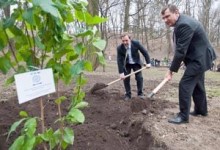Ukraine’s largest collection of magnolias, located in the Fomin Botanical Garden, has recently been replenished by 27 trees. The UN’s Ukraine representation gave them as a present in the early spring, but the cold weather pushed back the planting ceremony to April 13. On this day the heads of Ukraine’s 12 UN organizations, jointly with the garden’s employees, planted magnolias on the garden’s territory, founding a UN Green Alley. Similar actions have already taken place in Uzhgorod and Lviv, when local authorities and the Japanese embassy in Ukraine assisted in the planting Japanese cherry trees in support of the Japanese people. The action may also be called a token event, as it took place on the eve of Earth Day, marked on April 17. At the initiative of the UN General Assembly this year it was dedicated to forests and parks.
“In 10 years we will return to see whether the planted trees took root,” UNDP Resident Representative for Ukraine Olivier Adam said before starting to plant the magnolias. “The UN is doing a lot to preserve the planet and protect the environment. In 2006 the UN launched the Billion Tree Campaign and nearly 11 million trees have already been planted in various corners of the world. Therefore it is especially gratifying for us that such an alley has been launched in Kyiv, too.”
The magnolias were planted on a separate plot of the garden, because the one where the magnolia collection is growing is densely planted (nearly 100 specimens of these trees are growing on two hectares). “We have no place at all for new trees. Recently we have brought a white willow, known as the Shevchenko willow, from Kazakhstan, we have not decided yet where to plant it. We have found a place for the magnolias, but it is too shadowy, though we have changed the soil, dug deep holes, and we know how to look after these plants, so hopefully they will take root,” a research fellow at the botanical garden Zinaida Boniuk added.
While the UN delegation was planting the tree, the supervisor of the magnolia plot Roman Palahecha was observing the process, so that they did not damage the roots or fill the hole with too much soil. He explained why the so-called old magnolia garden (it is nearly 50 years old) has not blossomed yet: “As a rule, magnolias blossom from early April till May, but this year the blossoming season has moved because of the weather. The botanical garden has been collecting magnolias for 10 years and regularly replenishes the collection. Though these are subtropical plants, which grow in China and Japan, they easily take root in our country, blossom and produce seeds, from which one can grow new trees.”
Such goodwill actions by UN organizations in Ukraine can serve as a good example for those in power. But the head of the Fomin Botanical Garden Vasyl Kapustian complained that he had many times appealed to the Kyiv authorities with an initiative to draft a scholarly program, according to which the garden could give the city young plants, like the magnolias, to plant in parks and public gardens, but to no avail. As a rule, Ukrainian parks and botanical gardens receive presents only from international organizations or individuals. Incidentally, on the same day when the UN Green Alley was founded the garden received five tree peonies, bought for patrons’ money.







